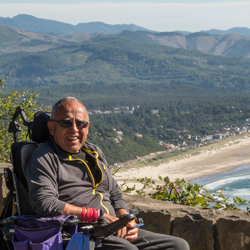Francis received this note from his neurologist friend, in response to his post ‘Moments of Being.‘
Dear Francis,
I reread your beautiful and touching piece about Fred and Sylvia just now, in that very tranquil time of night, when all are asleep and when only the voice of Nemette used to be active on the old WQXR to quiet the nerves. There is something so wonderful about the deep silence of the wee hours and the ability to immerse oneself fully in such a nice story as yours.
Apart from the moving lines about Fred and his vivacious companion whose antics you paint very descriptively, there are touches about the rest of the trip and the suggestion of great and wondrous things you saw and learned about. It is the kind of trip I would relish myself. Thanks again for sharing all of this with me and those to whom you chose to send your letter.
I would only suggest that you send it to Henri and Helene, who would enjoy it enormously, I am sure.
Perhaps you might turn this into a more complete lecture at the Society this year. It has so much that deals with the mechanisms with which the human spirit compensates for the real stumbling blocks of existence.
ALS, and kindred neuromuscular ailments, is truly one of the great stumbling blocks of existence. I have seen examples of great heroism in patients who have ultimately succumbed, but whose fighting spirits were never totally daunted by the deterioration of their bodies. One of those was my dearest friend, Dr. Yasin Balbaky, a psychiatrist in Boston, whose last three years of immobility I witnessed on numerous day long visits from one Sunday to another. It took enormous effort to communicate with his residual faint vocal utterances or to patiently await his often partial, but communicative written scraps. I felt I was communicating directly with his soul because his body seemed to have vanished and had deteriorated to something like a confessional screen through which the spirit floated from him to me and back. During that time, I was able to understand that despite the total alteration of the (neuromuscular) physical self, there persists a mental (brain) function that can be perceived, felt, and to which one can respond and be received. I remember his saying that his was a very difficult state with which many would not be able to cope but that he was still there for us. I think that psychiatry has not been able (or willing) to deal with this (final) stage of neurological deterioration in which feeling, affect, and understanding persist to the very end.
Yasin, like Fred, had been a very active person until the final stages of immobility, always interested in others, and in the intimate lives of his patients and family. I understand fully how your experience provided a unique moment of being and thank you for allowing me to share it with you in this very small, but fulfilling way.
Cheers,
Bob








